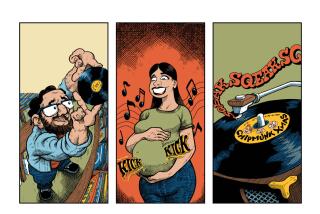Labels’ Online Hope: New Enhanced CDs
- Share via
Recording artists may moan about consumers grabbing free music off the Internet and burning their own CDs, but that’s exactly what punk band Sum 41 is inviting fans to do.
Before downloading the free live recordings, though, fans will need to buy something: the band’s new CD, “Does This Look Infected?” It’s their plastic pass to the virtual concert hall.
The forthcoming release from Sum 41 typifies what a growing number of bands and record labels are doing to combat piracy on the Net. To persuade consumers to buy the CD instead of downloading free unauthorized copies online, they’re offering an assortment of songs, contests and other goodies that can be obtained only with the disc.
This new generation of enhanced CDs tries to tap consumers’ enthusiasm for playing music on their computers, rather than trying to squelch it like some of the labels’ anti-piracy efforts. Enhanced CDs also aim to help labels and artists establish a direct, continuing connection with fans. It’s a bit like the extra features on a DVD movie, but the bonuses are stored online where they can be updated and personalized.
Some enhanced CDs can even track which songs from the album consumers are playing and give companies instant feedback on where the CD is selling. This kind of monitoring may unnerve some consumers, but the companies involved insist that there’s no threat to privacy.
When it comes to fighting piracy, the technology has some notable shortcomings. With a few exceptions, consumers with homemade or pirated copies of the original disc can still obtain the online bonuses. And in most cases, the extras are appealing only to the band’s biggest fans -- the ones most likely to buy the CD anyway.
So far, the public’s response to enhanced CDs has been lukewarm at best. Industry executives say that only 5% to 10% of people who buy the average enhanced CD use the special features.
Analyst Phil Leigh at Raymond James & Associates, an investment bank, said the main thing consumers want is a disc full of songs they like. If an enhanced CD “still has only three tracks out of 12 they want,” Leigh said, the online extras aren’t going to be enough.
Despite all this, enhanced CDs are gaining momentum across the music industry. Artists releasing enhanced CDs this fall include such leading names as Santana -- whose enhanced CD “Shaman” debuted at the top of the Billboard charts -- Bon Jovi, Tori Amos and Jennifer Lopez.
“If we can enhance, we will,” said Jordan Katz, senior vice president of sales at Arista Records, a subsidiary of Bertelsmann-owned BMG. “You will see a lot of our artists with enhanced CDs.”
Several label executives said enhanced CDs aren’t just about fighting piracy; they also provide an outlet for more of an artist’s material. And the extras they provide aren’t the only ones the labels are stuffing into CD packages. For example, rapper Eminem included a bonus DVD in the first 2 million copies of his latest album.
A recent informal poll by Billboard magazine’s Web site suggests that Internet-savvy music fans may be warming to enhanced CDs. Nearly 60% of the 5,000 Web surfers who took part in the poll responded favorably to the extra features, while the rest said the bonuses played no role in their decision whether to buy a disc, Billboard.com reported.
Enhanced CDs have been on the market at least since the mid-1990s, but the technology has changed significantly over the years. The early versions offered text and graphics that were pressed onto the disc and couldn’t be updated. Some also included a link to a special Web site, but those sites were accessible to anyone who knew their Web addresses, not just those who bought the CD.
The latest versions are more sophisticated. Rather than having bonus features on the disc, as DVD movies do, the latest enhanced CDs typically include only the electronic keys needed to gain access to extra benefits online. Another approach is to include a customized Web browser and online chat software that launches automatically when the disc is played on an Net-connected computer.
Island Def Jam Music Group, a subsidiary of Vivendi Universal, goes one step further on the latest Bon Jovi and Sum 41 releases. Users not only must possess the disc, they also must enter a unique code from the CD package to get the extras.
To executives at Sony Corp., which has been issuing enhanced CDs since 1995, the most important difference is that most music fans now have computers and Internet connections.
*
Making Old New Again
In the old days, the limited initial audience made it harder to persuade artists and label executives to make online extras part of the marketing plan, said Fred Ehrlich, president of new technology and business development at Sony Music Entertainment. “Now, in label meetings, the marketing people, the people who are creating the music and the video, they’re looking at how their creations could be used” to enhance CDs, he said.
Any CD can be turned into an enhanced -- or “ConnecteD,” in Sony parlance -- product, even those already on store shelves. That’s because the technology for recognizing discs is at the Web site, not on the discs themselves.
That means labels can update and refresh old releases with new material, just as movie studios re-release movies on DVD with new commentary tracks and bonus features. Not only could the technology extend the shelf life of a CD, it also enables artists and labels to keep wooing fans long after they have bought the disc.
Another option is to use an enhanced CD to promote the band’s next release or a disc by a related artist, said Daniel Sloop, vice president of business development at Infotects Inc., which makes CD-recognition software. For example, a month before the band Disturbed released its latest CD, it gave fans who bought its previous release a chance to listen to the new tracks.
Katz of Arista said an artist’s biggest fans are going to buy a new CD right away, whether or not they know about any enhancements. But the online extras can add to those buyers’ enthusiasm for the disc after they take it home, leading them to talk it up to their friends and, potentially, sustaining sales after the first week, he said.
A major problem for the labels has been the sharp decline in sales of hit records after the first week, which many executives blame on people recording copies of CDs for their friends. “If you have this enhanced component, when you tell your friend about it, that may discourage CD burning,” Katz said.
The Santana CD uses Bandlink software from Javakitty Media Inc. of Atlanta to connect listeners to the Web, where they can watch the band’s latest music video, hear an unreleased track, see interviews and collect information about Carlos Santana. It also enables people to chat online with other fans.
The objective, said Javakitty co-founder Cedric Gore, is to create a virtual listening party where people can trade messages while playing the disc. Yet the technology’s not quite at that point -- anyone with the Bandlink software can join the chat, regardless of whether they have the CD.
*
New Kind of Charting
The Bandlink software also was designed to give labels and artists more feedback on their records. The software monitors which songs on the CD are played, revealing which ones are popular and which ones aren’t. That’s extremely valuable information for executives and artists picking singles to promote or songs to perform live. And if users fill out the registration information and reveal where they are, Javakitty can report the cities or even ZIP Codes where the CD is selling well.
Gore said the information is presented as a composite, and “none of it’s traceable back to an individual.” But unless users read the software’s licensing agreement or privacy policy -- the online equivalent of a contract’s fine print -- they won’t be aware that Bandlink is monitoring what they play.
Ideally, labels and artists would update the online component of an enhanced CD every few months, said Larry Kenswil, president of Universal Music Group’s ELabs. The limiting factor, though, is cost. The labels charge the same for enhanced CDs as for conventional ones, so money spent on the extras comes out of the disc’s profit.
Still, with artists routinely making behind-the-scenes videos and live recordings, there’s no shortage of low-cost material for enhancements, Kenswil said. “We’re finding that things like concert tickets and exclusive Web access work best, but that may very well vary from artist to artist and genre to genre,” he said.
“Content is king,” said Sloop of Infotects. “The cooler the stuff, the higher the percentage [of users]. If you have stuff that wouldn’t even make the B side, that’s not very compelling.”
*
(BEGIN TEXT OF INFOBOX)
A CD that’s more than music
To boost sagging sales, record companies are marketing enhanced CDs. Online bonuses, obtainable only with a password or “electronic key” from the disc, let listeners get more connected with the music via the Internet.
A sampling of enhancements:
Eminem -- “8 Mile” soundtrack
Exclusive audio and video accessible to the listener using a computer.
Santana -- “Shaman”
Access to Santana retrospective video, an extra song, videos and an online chatroom.
Tori Amos -- “Scarlet’s Walk”
Access to additional photos, writings, graphics and music.
Bon Jovi -- “Bounce”
Early access to concert tickets, an extra song and screensaver.
Sources: Recording Industry Assn. of America, Billboard.com
More to Read
The biggest entertainment stories
Get our big stories about Hollywood, film, television, music, arts, culture and more right in your inbox as soon as they publish.
You may occasionally receive promotional content from the Los Angeles Times.










